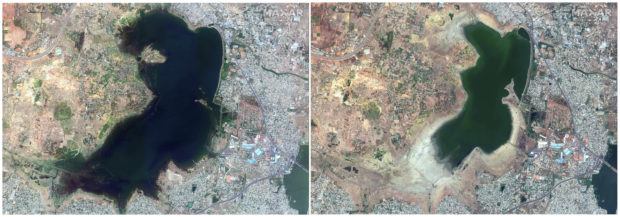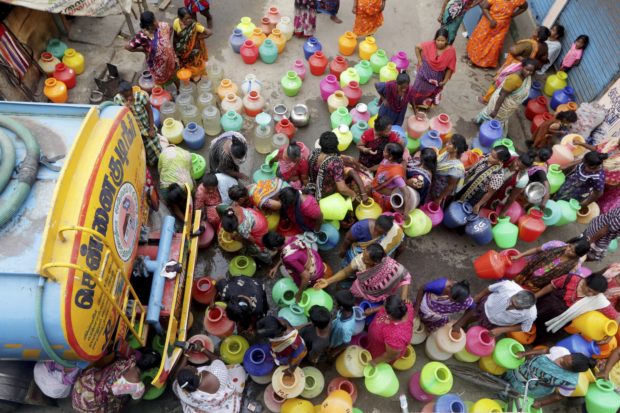Parts of southern India facing acute water shortages

This combo of June 15, 2018, satellite image, left and April 6, 2019, satellite image right provided by Maxar Technologies shows Puzhal reservoir in Chennai, India before and during drought. Millions of people are turning to water tank trucks in the southern Indian state of Tamil Nadu as house and hotel taps run dry because of an acute water shortage caused by drying lakes and depleted groundwater. (Satellite image ©2019 Maxar Technologies via AP)
NEW DELHI — Millions of people are turning to water tank trucks in the southern Indian state of Tamil Nadu as house and hotel taps run dry because of an acute water shortage caused by drying lakes and depleted groundwater.
State Rural Development Minister S.P. Velumani said Wednesday that the drought followed a 62% shortfall in monsoon rains last year compared to 2017.
People are lining up for water cans in the state capital of Chennai.
Some companies have asked employees to work from home. Some restaurants are closing early and even considering not serving lunch if the water scarcity worsens.
Gauri Shankar, general manager of Hotel Deccan Plaza in Chennai, said two tank trucks bring water to the hotel every day from a town 60 kilometers (40 miles) away at a cost of 4,000 rupees ($57) each.
Article continues after this advertisement“Even a water tanker is proving difficult to get in the city. We are getting our supply because we entered into a contract with a supplier in September as the water taps started going dry,” Shankar said by phone.
Article continues after this advertisementChennai is India’s sixth-largest city with an estimated population of 10 million. It is a major destination for medical tourism, and Tamil Nadu state is a car manufacturing hub.

Indians stand in queues to fill vessels filled with drinking water from a water tanker in Chennai, capital of the southern Indian state of Tamil Nadu, Wednesday, June 19, 2019. Millions of people are turning to water tank trucks in the state as house and hotel taps run dry in an acute water shortage caused by drying lakes and depleted groundwater. Some private companies have asked employees to work from home and several restaurants are closing early and even considering stopping lunch meals if the water scarcity aggravates. (AP Photo/R. Parthibhan)
Top elected official K. Palaniswami said the state has diminishing groundwater supplies and has asked other states for spare water until October’s monsoon rains.
Monsoons reach different parts of India at different times.
Northern and eastern India have experienced heatwaves with temperatures soaring to 48 Celsius (118 Fahrenheit) amid a delayed monsoon. At least 90 people have died due to heat stroke in the eastern state of Bihar since June, according to the state disaster management department.
This year’s monsoon arrived in the southern state of Kerala a week late and slowly started moving to other parts of country.
India is facing a 43% shortfall in monsoon rains across the country because of its late arrival, according to the India Meteorological Department.
Meteorologists said monsoon rains usually cover two-thirds of the country by mid-June. However, they currently have reached less than half that area. But the monsoon’s progress is expected to pick up in the next 10 days. /kga